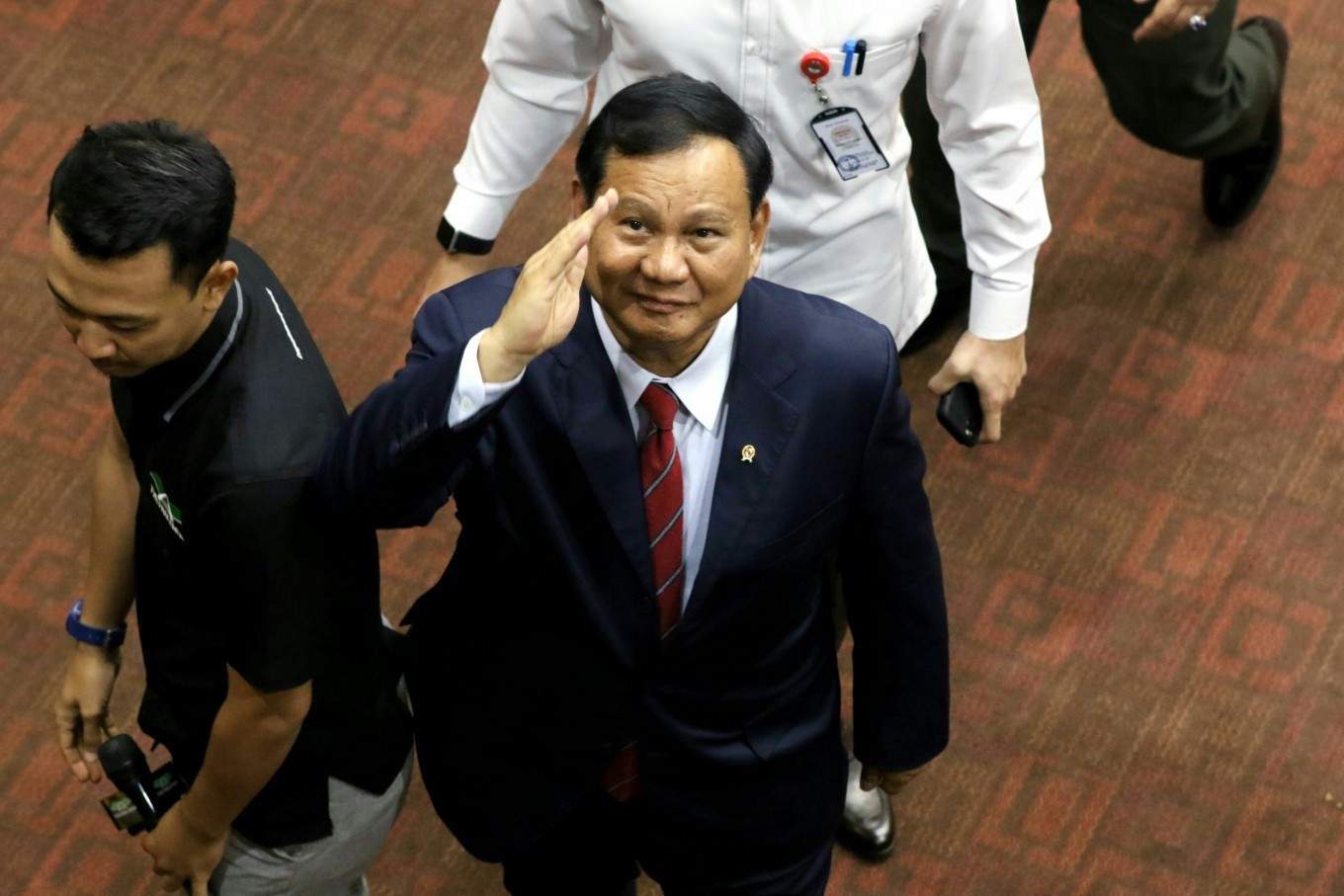News
Prabowo launches diplomatic offensive in Islamic world
Tenggara Strategics April 21, 2025 Defense Minister Prabowo Subianto attends the inaugural working meeting with the House of Representative's Commission I on Sept. 11, 2019, at the Senayan Parliament Complex in Jakarta. (JP/Dhoni Setiawan)
Defense Minister Prabowo Subianto attends the inaugural working meeting with the House of Representative's Commission I on Sept. 11, 2019, at the Senayan Parliament Complex in Jakarta. (JP/Dhoni Setiawan)
Indonesia has always kept a low profile in the Islamic world despite being the country with the largest Muslim population in the world. It has not taken any noteworthy initiative in the Organization of the Islamic Conference (OIC) comprising mostly Muslim-majority countries, which is riveted with geopolitical competition among its members. Indonesia’s main contribution is in making up the number to bolster the collective voice of the pan-Islamic group.
President Prabowo Subianto may change Indonesia’s posture in the Islamic world following his whirlwind tour this month of five predominantly Muslim nations: The United Arab Emirates, Turkey, Egypt, Qatar and Jordan. While he discussed strengthening bilateral relations, mainly in the economic sector, he also raised the issue of the Palestinian-Israel conflict during the trip.
Not coincidentally, these are countries that play some role in the search for a solution to the conflict. All but one has formal ties with Israel. Qatar has been brokering peace, including cease-fire agreements, between Israel and Hamas, the armed Palestinian resistance group. In Turkey, Prabowo discussed possible collaboration on Gaza with his counterpart Recep Tayyip Erdogan.
One clear immediate goal from his trip is for Indonesia to carve out a role to help end the Israeli military operation in the Hamas-controlled Gaza Strip. Not clearly spelled out is the possibility of Indonesia helping to rebuild Gaza, and beyond that, the search for the solution to the conflict, or the implementation of the Two-State Solution that has been on the table for decades.
In speeches during his tour, Prabowo broached Indonesia’s initiative to evacuate 1,000 people from war-torn Gaza, making it clear that he is talking about taking in those requiring immediate medical attention including those traumatized by the war. If accepted, this would mark Indonesia’s token entry into the peace-making efforts in the region.
His initiative sparked controversy at home and abroad, with accusations that he is playing into the hands of Israel and United States President Donald Trump’s plan to expel all two million Gazans. The real estate billionaire has openly stated he wants to turn the area into the “Riviera of the Middle East”. Expect more shocking initiatives from him when he tours the Middle East in May.
Indonesia has been cited by US officials as one of the Muslim-majority countries where the Gazans could be resettled, willingly if not by force. But the Foreign Ministry in Jakarta has rejected the suggestion out of hand, saying the matter has never been discussed.
Responding to critics of Prabowo’s plan at home, Foreign Minister Sugiono made the distinction between “evacuation” and “relocation”. Indonesia is going with the former, and the scale, a few thousand at the most, would be insignificant to be considered as part of Trump’s plan.
Prabowo’s plan predates Trump’s initiative to acquire Gaza. In June, he attended a summit in Jordan to discuss Gaza, then in his capacity as president-elect and defense minister. He said at the time that Indonesia would take 1,000 Gazans needing medical treatment, and another 1,000 children and orphans so that they could continue school.
Critics of the plan say that Indonesia has to make sure that those evacuated would be able to return to Gaza, which could be an unlikely prospect if Israel wipes out the entire region.
Also unclear is how Indonesia would evacuate the few thousands of Gazans without talking to Israel, which controls access to the region and with which Jakarta has no diplomatic ties.
Inaugurated in October, President Prabowo has taken over control of Indonesia’s foreign policy from the hands of senior diplomats, departing from many traditional policies such as in dealing with China, and his decision in joining the inter-governmental group called BRICS which is challenging the existing global financial system controlled by the US.
His Gaza initiative is another major departure from tradition, and the five-nation tour looks like a strategic move for Indonesia to become a major player in the Islamic world.
While Indonesia can give the OIC a miss, it may have the opportunity to crack the Islamic world next year when it takes over the chairmanship of the D-8 organization for economic cooperation among Bangladesh, Egypt, Indonesia, Iran, Malaysia, Nigeria, Pakistan, Turkey, and Azerbaijan. Although it is not an Islamic state, the country nevertheless is ready to play the Islamic card.
Prabowo has traveled abroad extensively, first as president-elect after winning the vote in February last year and after his October inauguration, earning him accolades as a foreign-policy president. This is in contrast to his predecessor Joko “Jokowi” Widodo, who shied away from the international spotlight throughout his 10-year presidency.
He skipped the tradition for new ASEAN leaders to visit the other capitals immediately after their inauguration, sending clear signals that he is looking beyond Southeast Asia and even the larger Indo-Pacific region for his diplomatic engagements.
Indonesia is not without the credentials to take on the global stage, including Prabowo’s bid to lead the Islamic world. It is now accepted as a middle power, from the combination of its size and economic strength. It is the fourth most populous nation in the world, 16th largest economy, the third largest democracy and the largest democracy in the Muslim world.
Prabowo can count on Indonesia’s past diplomatic achievements as he pushes the country, and himself, to be considered a global player. They include the 1955 Asia-Africa conference in Bandung, West Java, the brokering of peace among warring Cambodian factions in the 1980s-1990s, and its leadership and the many initiatives it has taken in ASEAN, one of the world’s most successful regional organizations.
What we've heard
A member of the House of Representatives familiar with the trip stated that the agenda for the Middle East was different from the government’s lobbying efforts with the United States. “This was a state visit for business cooperation,” he said.

